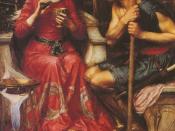Tragedy and Aristotle Ancient Greece was the birthplace of drama. Drama comes from Greek words meaning "to do"� or "to act."� By the 5th century BC dramas were presented at religious festivals twice a year (Ancient Greek n.pag). These grew out of the worship of the god Dionysus. The most famous classic play-writes from this time were Aeschylus, Sophocles, and Euripides. Aristotle, a philosopher from the 4th century BC, wrote prescriptions for tragedy in his Poetics, which were based on these classic dramas. Aristotle called Euripides, author of Medea, "the most tragic of the poets because his plays were the most moving"� (Ancient Greek). Though modern tragedies follow different pretexts from the classics, they still follow basic principles. Fences, a modern drama by August Wilson, is a tragedy because it is easily comparable to Medea which is consistent with Aristotle's prescriptions.
First of all, for a drama to be considered a tragedy it must portray events of grave importance as Aristotle explains, "a tragedy, then, is the imitation of an action that is serious."�
Medea demonstrates serious events as Jason, Medea's husband leaves her to marry the princess of Corinth: "[H]e, my own husband, has turned out wholly vile"� (Euripides 8). The drama also exhibits seriousness through the deaths of the princess, Creon (her father and king of Corinth), and Medea's children: "There they lie close, the daughter and the old father, / Dead bodies, an event he prayed for in his tears"� (39). Fences also contains elements of seriousness that could parallel Medea as to the effect that the father in the story, Troy, commits adultery: "I'm trying to find a way to tell you"æ I'm gonna be a daddy. I'm gonna be someone's daddy"� (Wilson 66). Troy also forms a distant relationship from his...


